Overview
This article delves into the vital realm of adult home care, recognizing its significance for families and caregivers who strive to provide essential support for seniors and individuals with disabilities. It thoughtfully highlights the diverse services available and the profound benefits of personalized care.
As we navigate an aging population, the growing demand for these services becomes evident, underscored by compelling statistics and trends in the home care market. We understand that this journey can be overwhelming, but know that we’re here for you, ensuring that your loved ones receive the compassionate care they deserve.
Introduction
In our increasingly aging population, the demand for adult home care services is soaring, offering a lifeline for seniors and individuals with disabilities who wish to maintain their independence in the comfort of their own homes. This comprehensive care model encompasses a range of personalized services, from assistance with daily activities to skilled medical support, all aimed at enhancing the quality of life for clients and alleviating the emotional burdens on family caregivers.
As the adult home care market continues to grow, understanding the various options available and the benefits they provide is essential for families navigating this critical decision. We recognize that this journey can be overwhelming, and we’re here to help you explore the many facets of adult home care. This article delves into its significance, the types of services offered, and how to choose the right provider to ensure that your loved ones receive the compassionate and effective care they truly deserve.
What is Adult Home Care? An Overview
Adult support encompasses a wide array of services designed to assist individuals, particularly seniors and those with disabilities, in the comfort of their own homes. This support model includes personal assistance with daily tasks, medical support, and companionship, all aimed at fostering independence and ensuring safety. The primary goal of adult support services is to enable individuals to live comfortably in their residences while receiving essential assistance tailored to their specific needs.
By 2025, the adult support services market is experiencing significant growth, driven by a rising senior population that prefers to age in place. Recent statistics reveal that over 1.4 million individuals reside in Medicare- and Medicaid-certified facilities across the country, underscoring the demand for alternative support options that promote greater independence. Furthermore, a report from MarketsandMarkets projects a need for 924,000 personal support assistants and home health workers from 2021 to 2031, highlighting the increasing importance of home health services.
Effective adult home care programs focus on preserving independence for seniors, offering customized assistance plans that adapt to changing needs. These programs often combine skilled nursing, personal assistance, and companionship, ensuring that clients receive comprehensive support. Best Care Nurses Registry exemplifies this approach by providing flexible services without long-term contracts, a concierge program for 24/7 nurse access, and guaranteed compatible provider matches.
This commitment to personalized support not only enhances the quality of life for seniors but also alleviates the emotional burdens on family members, ensuring that loved ones feel secure and content in their homes.
Moreover, at-home health services are often more cost-effective than traditional nursing facilities, allowing families to access quality assistance without financial strain. Best Care Nurses Registry ensures that all caregivers are rigorously vetted to meet high standards of quality and reliability, providing peace of mind for families.
Current trends in adult residential services emphasize the importance of individualized support and the integration of technology to enhance service delivery. Experts agree that in-home assistance not only improves the quality of life for seniors but also provides emotional comfort and support for family members. By prioritizing personalized care and maximizing long-term assistance insurance benefits, health service providers like Best Care Nurses Registry can profoundly impact the well-being of their clients, making it an essential aspect of the health service landscape today.
To learn more about how Best Care Nurses Registry can assist you or your loved ones, call (888) 203-2529 to schedule a consultation today.
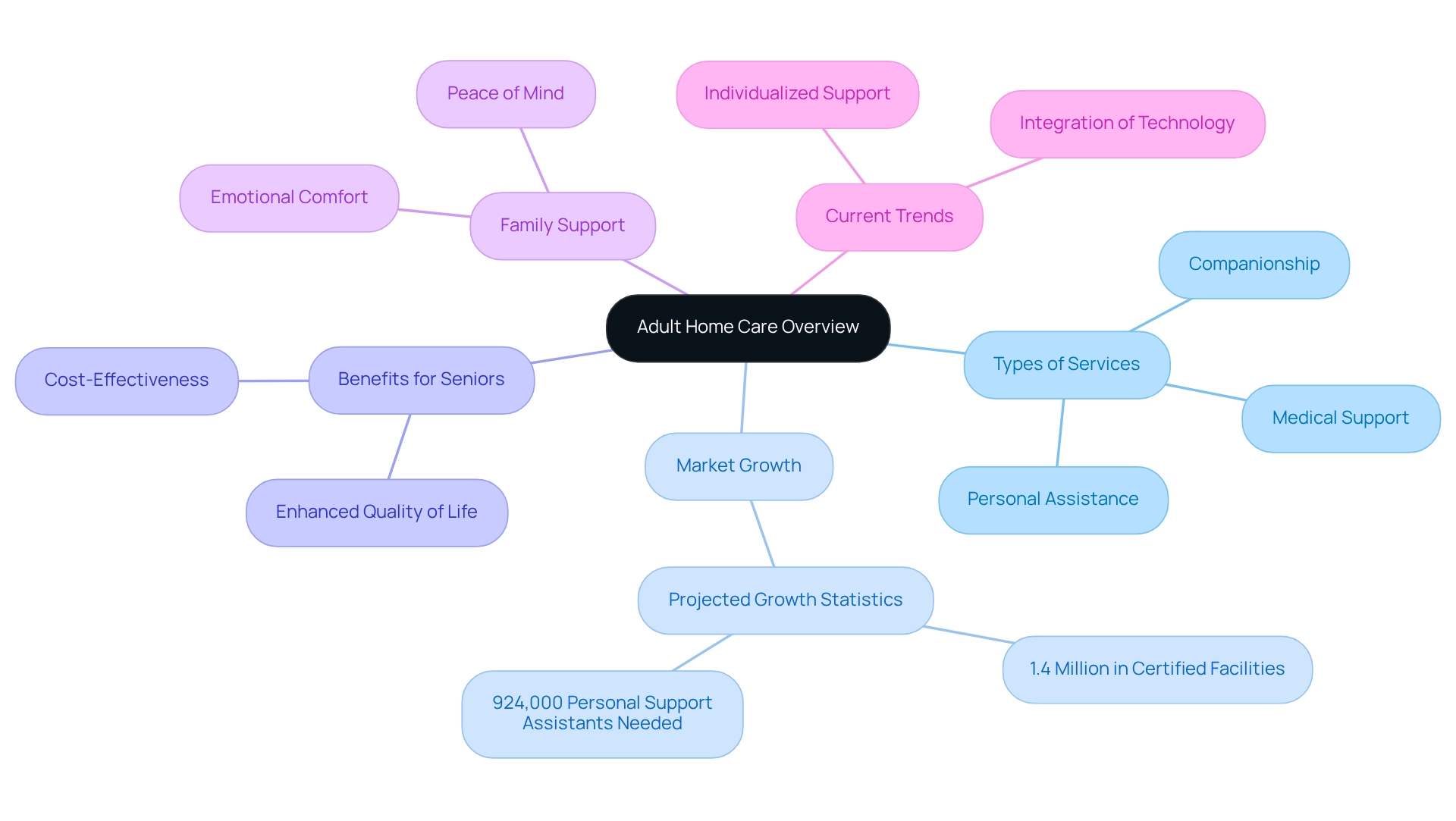
Types of Adult Home Care Services Available
Adult support services, including adult home care, offer a range of essential assistance options tailored to meet the diverse needs of seniors and their families. These services can be categorized into several key areas:
- Personal Care Services: These services are designed to assist individuals with daily activities such as bathing, dressing, grooming, and personal hygiene tasks. They play a vital role in preserving dignity and independence among seniors. With industry projections indicating a 4.2% annual growth in the adult home care sector, it’s clear that the demand for these services is on the rise. Customized assistance options from Best Care Nurses Registry ensure that seniors receive the attention they need, enhancing their quality of life.
- Companionship Services: These services provide essential social interaction and emotional support, helping to alleviate feelings of loneliness and isolation that many older adults experience. By fostering meaningful relationships, companionship services contribute significantly to overall well-being. A case study reveals that 85% of caregivers are relatives, with 42% caring for a parent, highlighting the importance of understanding relational dynamics in caregiving. Best Care Nurses Registry offers tailored adult home care services to ease the burden on family caregivers, ensuring that seniors feel supported and connected.
- Skilled Nursing Services: Delivered by registered nurses (RNs) or licensed practical nurses (LPNs), skilled nursing services encompass medical assistance such as medication management, wound care, and chronic condition monitoring. This level of support is crucial for seniors with complex health needs. As gerontologist Mary McDonald Winners aptly states, “Long-term assistance is support for an individual that helps with grooming, bathing, dressing, eating, and other tasks throughout the day.” The significance of professional caregiving in adult home care cannot be overstated, as it greatly enhances the quality of life for seniors.
- Physical Therapy: These rehabilitation services aim to help individuals regain mobility and strength following illness or injury. Physical therapy is essential for improving quality of life and promoting independence, particularly for seniors on the road to recovery.
- Homemaker Services: These services assist with household tasks such as cleaning, cooking, and laundry, enabling seniors to maintain a clean and safe living environment without unnecessary physical strain. This support is crucial in preventing household hazards that can arise from neglect.
- Respite Service: Providing short-term support for primary caregivers, respite services allow them to take necessary breaks while ensuring their loved ones continue to receive high-quality assistance. This service is vital in preventing caregiver burnout and ensuring that family members can prioritize their own well-being.
Statistics indicate that a significant number of seniors utilize personal support services, often preferring this type of help over skilled nursing. Recent studies show that approximately 70% of seniors receiving assistance opt for personal support services, underscoring the need for help that promotes independence and comfort. Best Care Nurses Registry is dedicated to delivering adaptable and compassionate adult home care services, including 24-hour assistance and personalized support, to meet the unique needs of each individual.
As the adult home care sector evolves, it’s essential for families to stay informed about the various types of services available. By understanding the distinctions between personal assistance, companionship, skilled nursing, and other services, families can make informed decisions that best suit their loved ones’ needs. Notably, there are 5.5 million caregivers for former or current military personnel in the U.S., with 96% of caregivers being female, reflecting the demographics and support needs of caregivers today.
If you have concerns about the safety and well-being of your loved ones, please reach out to Best Care Nurses Registry. Contact (888) 203-2529 to discuss tailored support options that can enhance the quality of life for seniors and provide peace of mind for their families.
Benefits of Choosing Adult Home Care for Your Loved Ones
Choosing adult home care offers a multitude of advantages that can significantly enhance the lives of seniors and their families.
- Maintained Independence: Seniors can continue living in their familiar surroundings, fostering a sense of comfort and autonomy. This independence is crucial; studies show that nearly one-third of Americans have cared for an elderly, ill, or disabled family member, underscoring the importance of supportive environments. At Best Care Nurses Registry, we ensure that your loved one can thrive at home, surrounded by the familiarity they cherish.
- Personalized Assistance: Our home support services are customized to meet the unique needs of each individual, ensuring that support is both relevant and effective. Our empathetic providers work closely with relatives to create tailored support strategies that address specific health issues and personal preferences, leading to improved outcomes and an elevated quality of life.
- Cost-Effectiveness: Opting for home support can be more economical than nursing homes or assisted living facilities, especially for seniors requiring minimal assistance. This financial adaptability is essential for families managing long-term insurance claims, allowing them to optimize their benefits while ensuring quality support through Best Care Nurses Registry.
- Improved Quality of Life: With dedicated attention and support from our skilled caregivers, seniors often experience enhanced emotional well-being and overall satisfaction. Real-life examples show that individuals receiving home assistance report greater happiness and involvement in daily activities, leading to a more fulfilling life.
- Family Engagement: Home support enables relatives to remain actively involved in their loved one’s care, fostering stronger relationships. This participation not only alleviates the emotional burden of caregiving but also ensures that families can provide essential support while managing their own lives. Best Care Nurses Registry encourages family involvement, making care a collaborative effort.
Testimonials: “Best Care Nurses Registry has been a lifesaver for our family. The providers are empathetic and genuinely concerned about my mother’s well-being.” – A satisfied client.
The demographic profile of the senior population is evolving, with forecasts indicating that by 2060, the number of Americans aged 65 and older will rise from 46 million to 98 million. This shift necessitates a reassessment of services for the elderly. Furthermore, with one in four adults over the age of 65 experiencing falls each year, the role of in-home caregivers becomes increasingly vital in reducing such risks and promoting safety. Best Care Nurses Registry, with its extensive experience and strong reputation as a preferred choice for health services in South Florida since 1980, is well-positioned to meet these growing needs.
By choosing adult home care, families can greatly enhance the quality of life for their loved ones while ensuring they retain their independence.
Call to Action: To learn more about how Best Care Nurses Registry can assist your family, call us at (888) 203-2529 to schedule a consultation today.
Challenges Families Face in Caregiving and How to Overcome Them
Families often encounter a range of challenges when providing care for their loved ones, which can significantly impact their emotional and physical well-being. It’s important to acknowledge these struggles and address them with compassion. Key issues include:
- Emotional Stress: Caregiving can lead to feelings of guilt, anxiety, and burnout. A recent study indicates that those who provide care often experience worse health indicators compared to non-providers, with 13 out of 19 health metrics showing unfavorable outcomes. This corresponds with results from the case study ‘Changes in Health Indicators Among Those Providing Care,’ which emphasizes the negative relationships between caregiving and the health of those who provide care. To combat this, caregivers should prioritize self-care and seek assistance from community resources or support groups. Engaging in regular self-care activities can enhance overall well-being and reduce the risk of hospitalization. Significantly, dedicating 100 hours each year assisting friends or relatives can reduce the helper’s risk of hospital stays and death.
- Time Management: Balancing caregiving responsibilities with personal and professional obligations can be overwhelming. Establishing a structured schedule can help caregivers allocate time effectively, ensuring that both their needs and those of their loved ones are met. Utilizing tools like calendars or caregiving apps can streamline this process.
- Financial Strain: The costs associated with caregiving can accumulate quickly, leading to significant financial pressure. Statistics indicate that households offering assistance frequently encounter substantial out-of-pocket costs. Investigating financial support alternatives, like long-term insurance, can help ease some of this burden. Best Care Nurses Registry accepts most long-term support insurances directly, enabling relatives to instruct their providers to cover services without initial costs, unless an elimination period is in effect. Additionally, families should consider discussing financial planning with a professional to navigate these challenges effectively.
- Communication Barriers: Effective interaction with the recipient of assistance and healthcare providers is crucial for successful support. Families should practice open dialogue, actively listen to their loved one’s needs, and ensure that all parties are informed about care plans and medical decisions. This approach fosters trust and can lead to better health outcomes.
Real-world examples highlight the emotional toll of caregiving. For instance, those providing care often report feeling isolated and overwhelmed, which can exacerbate stress levels. As support provider Veronica Yepez states, “The rewarding part is knowing that we are all there for him,” illustrating the emotional benefits that can accompany caregiving.
Expert guidance indicates incorporating mental health support into caregiving practices, as this can greatly enhance the resilience of those providing care and overall well-being.
By tackling these obstacles directly and applying effective solutions, households can foster a more nurturing setting for both supporters and those receiving assistance, ultimately improving the standard of support offered. Best Support Nurses Registry is here to assist, offering adult home care and adaptable respite services customized to the requirements of caregivers and individuals of all ages, including help with activities of daily living such as bathing, grooming, and meal preparation. It’s crucial to recognize that although Medicare might offer restricted assistance, it does not encompass the entire spectrum of private duty support services, rendering long-term care insurance a beneficial choice for families pursuing extensive assistance.
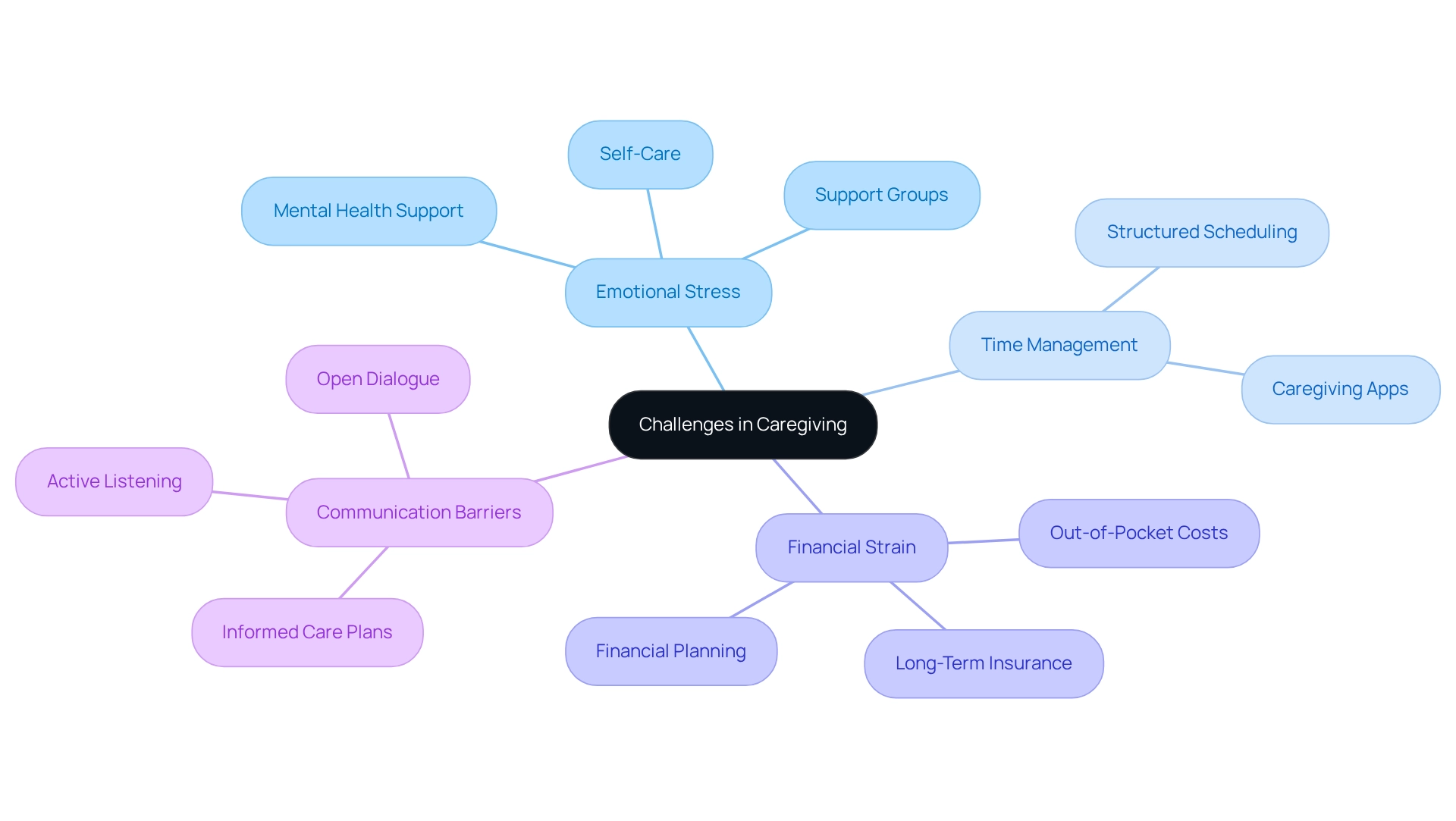
The Importance of Personalized Care in Adult Home Care
Personalized support is fundamental to effective adult home assistance, encompassing several key components that significantly enhance patient outcomes.
- Assessment of Individual Needs: The foundation of any support plan lies in a comprehensive assessment of the individual’s physical, emotional, and social needs. This initial assessment is vital for understanding the unique situations and preferences of each client, enabling a more focused strategy for support.
- Tailored Support Plans: Customization is essential; each support plan should reflect the individual’s preferences and goals. Best Care Nurses Registry guarantees that assistance is relevant and considerate, allowing caregivers to offer support that resonates with clients, ultimately leading to improved engagement and satisfaction.
- Flexible Companion and Sitter Services: Companion or sitter services can be tailored to meet the specific needs and schedules of your loved one. These services can be offered flexibly, ranging from a few hours weekly to full-time assistance, ensuring that seniors maintain their independence while receiving the support they need.
- Regular Reviews: Ongoing assessment of support plans is crucial. Frequent evaluations enable timely modifications according to changing needs, ensuring that the support provided remains effective and aligned with the client’s evolving situation. This adaptability is especially important in a dynamic domestic support environment.
- Building Relationships: Customized assistance nurtures trust and connection between caregivers and clients. Strong relationships enhance the overall caregiving experience, making clients feel valued and understood. This emotional bond can lead to better health outcomes, as clients are more inclined to follow treatment plans when they trust their caregivers.
The significance of individualized support is underscored by recent advancements in the health sector. For example, Best Care Nurses Registry has been delivering compassionate support solutions since 1980, reflecting an increasing acknowledgment of the need for customized approaches in home health services.
Statistics further highlight the importance of personalized assistance; the home support market is expected to expand by $164.86 billion from 2021 to 2025, indicating a growing demand for services that prioritize individual needs. Furthermore, expert insights reveal that tailored assistance not only enhances senior health outcomes but also alleviates emotional strain on families, allowing them to focus on their loved ones’ well-being. Certified professionals earn an average base pay of $15.65 per hour, showcasing the value and professionalism within the support sector.
Case studies, such as the WASP Service Evaluation, illustrate the effectiveness of customized support plans. This evaluation employs behavior change theory to assess and enhance personalized service delivery, demonstrating that adaptable frameworks can drive quality improvement initiatives in various settings. By focusing on individual requirements, support providers can significantly influence patient outcomes, making personalized assistance a vital element of adult home care.
Moreover, readability statistics reveal the complexity of language used in support plans and communications, emphasizing the importance of clear and accessible information for both caregivers and clients.
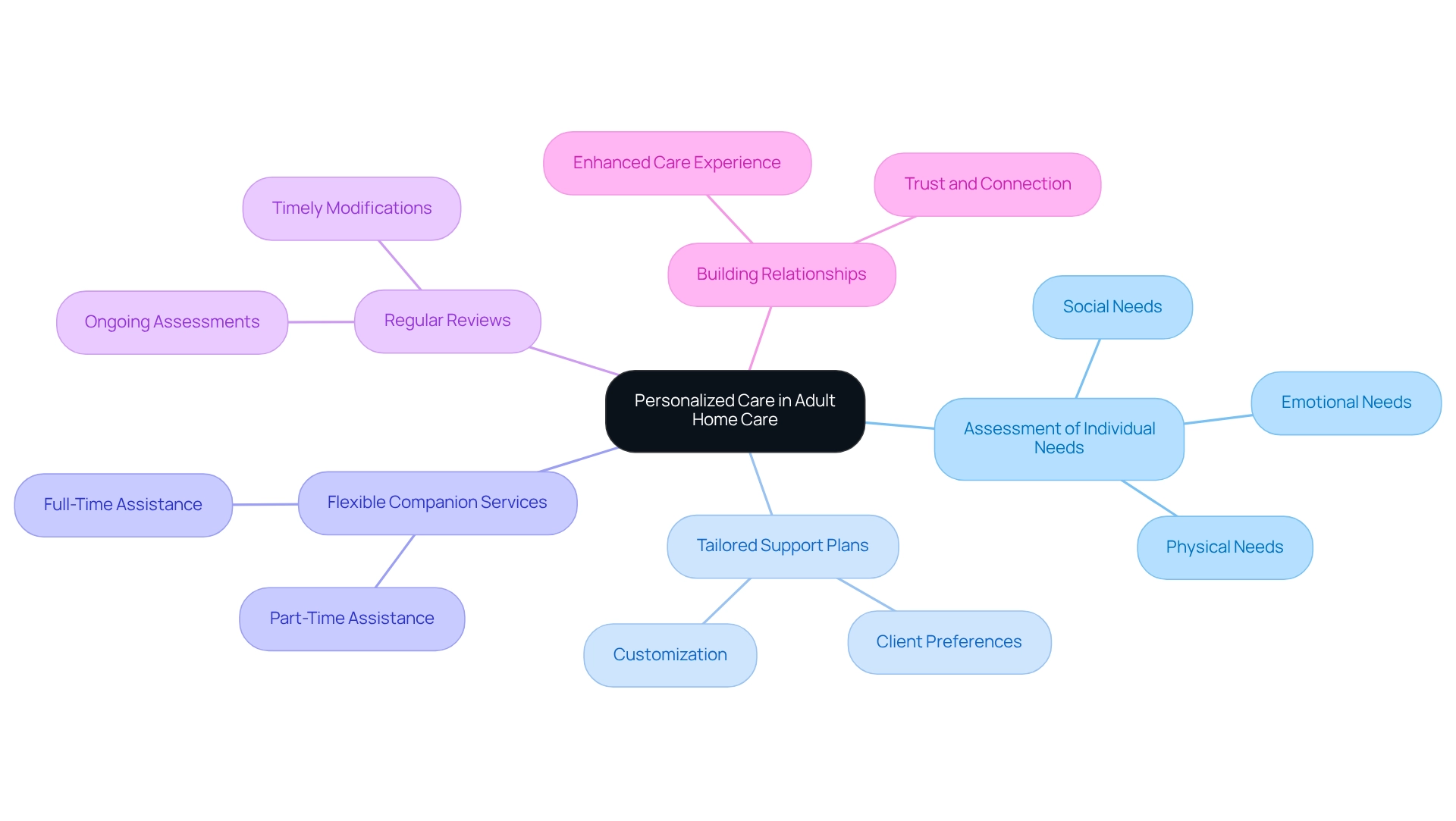
How to Choose the Right Adult Home Care Provider
Choosing the right adult support provider is a significant decision that requires careful consideration to ensure your loved one receives the best possible assistance.
-
Research Options: Begin by exploring local assistance agencies, such as Best Care Nurses Registry, known for providing Private Duty RNs and LPNs. Utilize online resources and read testimonials from other families to gauge the quality of services offered. It’s worth noting that families often spend an average of 10-15 hours researching home support options before making a decision, highlighting the importance of thorough inquiry.
-
Check Credentials: Verify that the agency is licensed and accredited, and ensure that the staff are adequately trained and screened. This is vital for maintaining high service standards. Industry experts recommend that agencies provide clear documentation of their credentials and training programs for caregivers. Additionally, consider the emotional and psychological stability of those providing support; studies reveal that 26% more individuals in these roles report experiencing substance abuse issues compared to those not in such positions.
-
Interview Providers: Schedule meetings with potential providers to discuss their services, support plans, and associated costs. This is a valuable opportunity to inquire about their experience with specific needs, such as chronic illnesses or mobility challenges. Engaging in this dialogue can help families understand the agency’s approach to care and the personalized support they can expect from Best Care Nurses Registry.
-
Assess Compatibility: It is essential to find a support provider who aligns with your loved one’s personality and preferences, fostering a trusting and comfortable relationship. Research indicates that emotional support is crucial, as one in three adults aged 50-80 report feeling isolated at least some of the time. A compatible caregiver can significantly reduce feelings of loneliness and improve the overall quality of life for seniors.
-
Review Contracts: Take the time to carefully review any contracts or agreements to understand the terms of service, including cancellation policies. Clarity in these documents is essential to avoid misunderstandings in the future.
By following these steps, families can make informed decisions when selecting an adult home care provider, ensuring that their loved ones receive the compassionate and personalized assistance they deserve. With over 1.4 million individuals living in Medicare- and Medicaid-certified nursing facilities nationwide, as reported by U.S. News & World Report, the need for quality alternatives like Best Care Nurses Registry is more critical than ever. Their commitment to personalized care and flexible support options ensures that families can find the right help tailored to their loved ones’ specific needs.
Moreover, recent statistics indicate that 87.3% of home health episodes resulted in patients improving their walking ability, underscoring the effectiveness of home health services in enhancing mobility and reducing hospitalizations.
Call to Action: To discuss your specific needs and discover how Best Care Nurses Registry can provide personalized support solutions, please call (888) 203-2529 today.
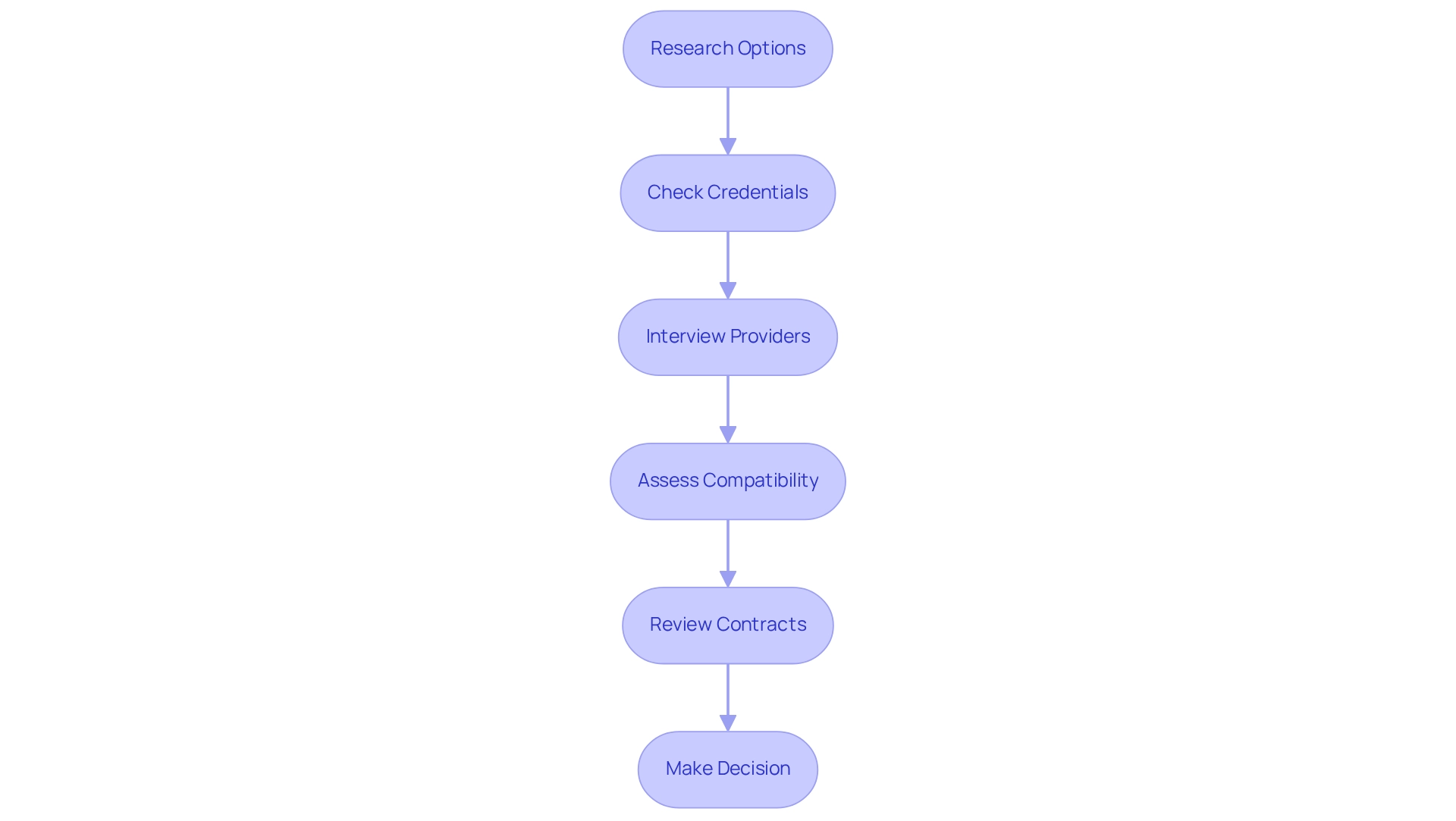
Effective Communication Strategies with Caregivers
- Be Clear and Concise: Clearly articulating needs and expectations is essential to prevent misunderstandings. Families ought to dedicate time to specify particular needs and preferences, ensuring that those providing assistance have a thorough comprehension of the support required. Best Care Nurses Registry emphasizes personalized care plans for adult home care that are tailored to each individual’s unique situation, enhancing the overall care experience.
- Practice Active Listening: Valuing the contributions of support providers is crucial. Families should engage in active listening, which entails not only hearing but also thoughtfully responding to the insights of those who provide care. This approach promotes a collaborative environment and enhances the relationship between families and their support providers, ensuring that the compassionate professionals referred by Best Care Nurses Registry feel supported and valued.
- Schedule Regular Check-Ins: Establishing regular check-ins is vital for maintaining open lines of communication. These planned conversations enable households and supporters to evaluate progress, tackle any issues, and adjust plans as needed, ultimately improving the quality of service delivered. Best Care Nurses Registry encourages households to use these check-ins to guarantee that assistance stays in line with the changing requirements of their loved ones.
- Encourage Feedback: Creating an open environment where caregivers feel comfortable sharing their observations and suggestions is important. Supportive feedback assists households in acquiring important perspectives on the treatment process and can result in enhancements in support strategies. As one participant noted, “I can’t think of anything to do to improve the program. I’ve learned several things to help me do a better job.” This feedback loop is crucial for nurturing a supportive environment that emphasizes compassionate assistance.
- Utilize Technology: Leveraging communication tools or apps can significantly enhance coordination among relatives and caregivers. These technologies can enable real-time updates on health plans and schedules, ensuring everyone is informed and aligned. Best Care Nurses Registry assists families in adopting these tools to enhance communication and improve service delivery.
Recent studies emphasize that effective communication is not just advantageous but vital in home assistance environments. For example, a communication breakdown can result in significant challenges, with studies showing a median reduction of 11.45 in performance when topics are not clearly conveyed. Moreover, the economic worth of unpaid support offered by family providers is estimated at $600 billion each year, highlighting the significance of enhancing the value of assistance through effective communication.
Regular check-ins have also been shown to positively influence the performance of those providing adult home care, reinforcing the need for structured communication practices.
Integrating these strategies can result in better caregiver-family interactions, ultimately augmenting the overall support experience for individuals receiving assistance. By prioritizing effective communication, households can alleviate some of the burdens faced by those providing care in adult home care, fostering a more supportive and collaborative care environment. Advocacy efforts are ongoing to raise awareness about the challenges faced by those providing care, emphasizing the need for better communication and support systems.
Additionally, caregivers often seek ways to capture and preserve unique family stories and memories, highlighting the emotional aspects of caregiving and the role of communication in fostering connections.
To discuss your needs and explore the personalized services offered by Best Care Nurses Registry, call (888) 203-2529 to schedule a consultation today.
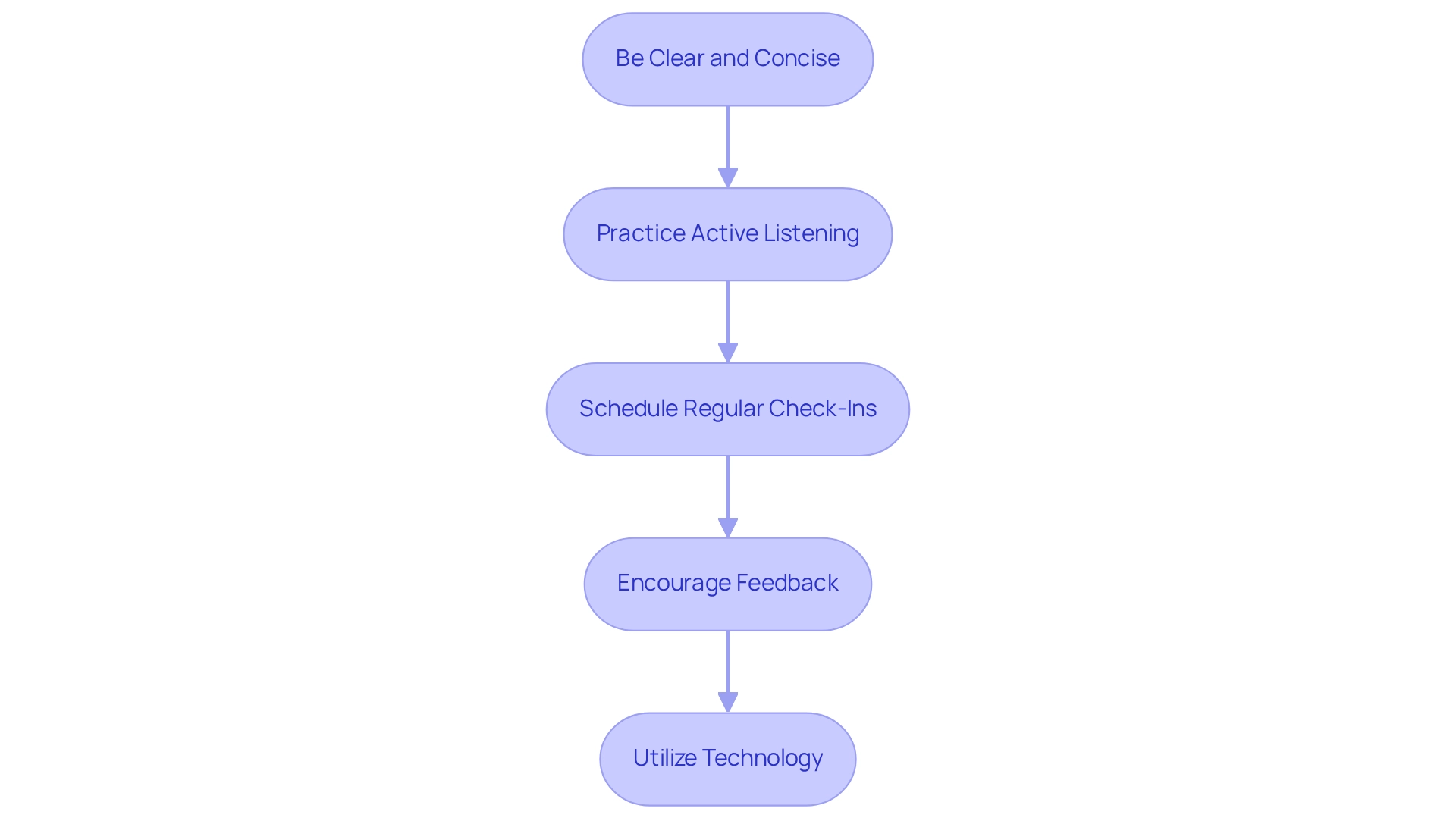
Understanding the Costs and Insurance Options for Adult Home Care
The expenses of adult home care can vary significantly based on the services required and the geographical location. It’s important to consider a few key factors:
- Average Costs: In 2025, the typical hourly rate for home care services ranges from $20 to $40, influenced by the complexity of care needed. For instance, specialized services such as skilled nursing may charge higher rates compared to basic companionship or personal assistance. As Marc Cohen, co-director for the Leading Age Long Term Services and Supports Center at the University of Massachusetts-Boston, notes, “The reason for the significant rise in in-residence assistance expenses arises from shortages in the nation’s health workforce along with increasing salaries for these employees.”
- Insurance Coverage: Different insurance programs, including Medicare and Medicaid, may cover certain at-home services. However, it’s crucial for families to thoroughly review their insurance policies to understand the extent of coverage for domestic assistance, especially since Medicare primarily focuses on skilled visits rather than the comprehensive support offered by private duty caregivers.
- Long-Term Care Insurance: This type of insurance can significantly alleviate the financial burden of home assistance. Best Care Nurses Registry accepts most Long Term Care insurances directly, allowing families to instruct carriers to cover services. Given the wide variation in policies regarding coverage and benefits, it is vital for individuals to carefully evaluate their options and comprehend the terms before making a commitment. Our team is here to help you review what your policy covers, ensuring you receive the necessary support.
- Payment Options: Many nursing agencies, including Best Care Nurses Registry, offer flexible payment arrangements tailored to the financial situations of families. Engaging in discussions with providers about payment models can lead to more manageable solutions, allowing families to focus on the well-being of their loved ones without undue financial stress.
- Financial Assistance Programs: Families should explore local and state financial aid programs that may provide support for residential services. These programs can help bridge the gap for those facing challenges with the costs associated with care. Additionally, seniors moving to assisted living facilities might consider renting out their previous homes as a source of income, which can serve as a temporary or long-term solution based on the family’s needs.
Understanding the financial landscape of adult home care is essential for families making these important decisions. With the direct assistance sector expected to create over 1 million new jobs by 2031, the demand for home support services is likely to rise, potentially impacting costs further. Therefore, proactive planning and informed decision-making are crucial to ensure that loved ones receive the care they need while maintaining their independence and quality of life.
Moreover, legislative advocacy plays a vital role in promoting beneficial policies that encourage investment and development in senior housing, which can also influence the overall costs of assistance.
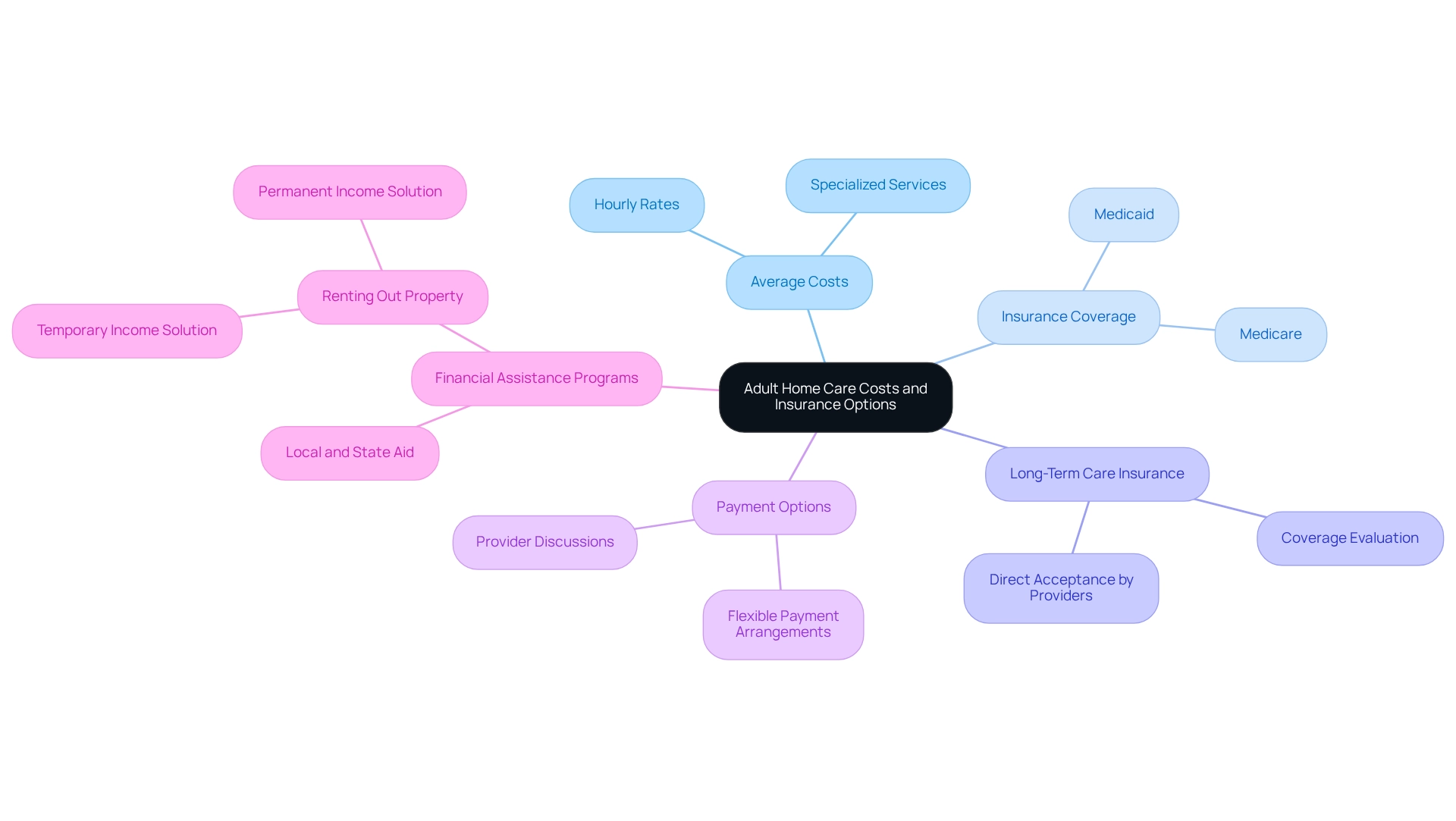
The Role of Technology in Adult Home Care Services
Technology is truly transforming adult home care services, enhancing the quality of care and improving outcomes for both patients and support providers. At Best Care Nurses Registry, we are at the forefront of this transformation, ensuring that your loved ones receive not only the best medical attention but also the emotional support they need to thrive at home. Let’s explore some key advancements that are making a difference:
- Telehealth Services: Virtual consultations allow providers to connect with healthcare professionals seamlessly, removing the need for in-person visits. This approach not only saves time but also ensures that patients receive timely medical advice, which is crucial for managing chronic conditions and alleviating the stress of family caregivers.
- Remote Monitoring: Innovative devices that track vital signs and daily activities play a pivotal role in enhancing patient safety. These tools can notify support providers of potential health issues, allowing for prompt intervention. For example, passive telemonitoring technologies, like bed sensors, can identify restlessness and sleep disruptions, offering valuable information for those providing assistance. As observed by Demiris, these technologies gather vital information regarding a patient’s state, which can greatly influence treatment decisions and offer reassurance to families.
- Medication Management Apps: These applications are vital for ensuring that medications are taken accurately and on time, notably decreasing the likelihood of mistakes. By offering reminders and monitoring compliance, these tools enable patients to handle their health more efficiently, permitting caregivers to concentrate on their own well-being.
- Communication Tools: Various apps and platforms promote smooth communication among relatives, caregivers, and healthcare providers. This connectivity guarantees that all participants in a patient’s treatment are informed and can collaborate efficiently, which is essential for coordinated support and emotional assistance for both seniors and their families.
- Smart Home Devices: Technologies like voice-activated assistants help seniors manage daily tasks, promoting independence and enhancing their quality of life. These devices can aid with reminders for appointments, medication schedules, and even emergency alerts, rendering them indispensable in domestic support environments.
The incorporation of these technologies not only simplifies service provision but also tackles essential challenges encountered by households. For instance, a study involving Almost Family, Inc. showed that telehealth significantly decreased hospitalization rates and boosted patient satisfaction by improving communication and collaboration among support teams. This aligns with the findings of Charles and colleagues, who identified three approaches to decision-making in healthcare that can be supported by technology.
However, it is essential to remain cautious of potential pitfalls, as highlighted by Peter Boling’s warning against creating technology silos in healthcare. As the environment of personal health services continues to develop, adopting these technological innovations is crucial for delivering high-quality, efficient assistance customized to the needs of seniors and their families, ensuring their safety and happiness in their residence. At Best Care Nurses Registry, we provide customized support plans and caregiver referrals to address the distinct requirements of your loved ones, particularly in the realm of adult home care.
We’re here for you. Call now to get started. Call (888) 203-2529 to schedule a call and discuss your needs.
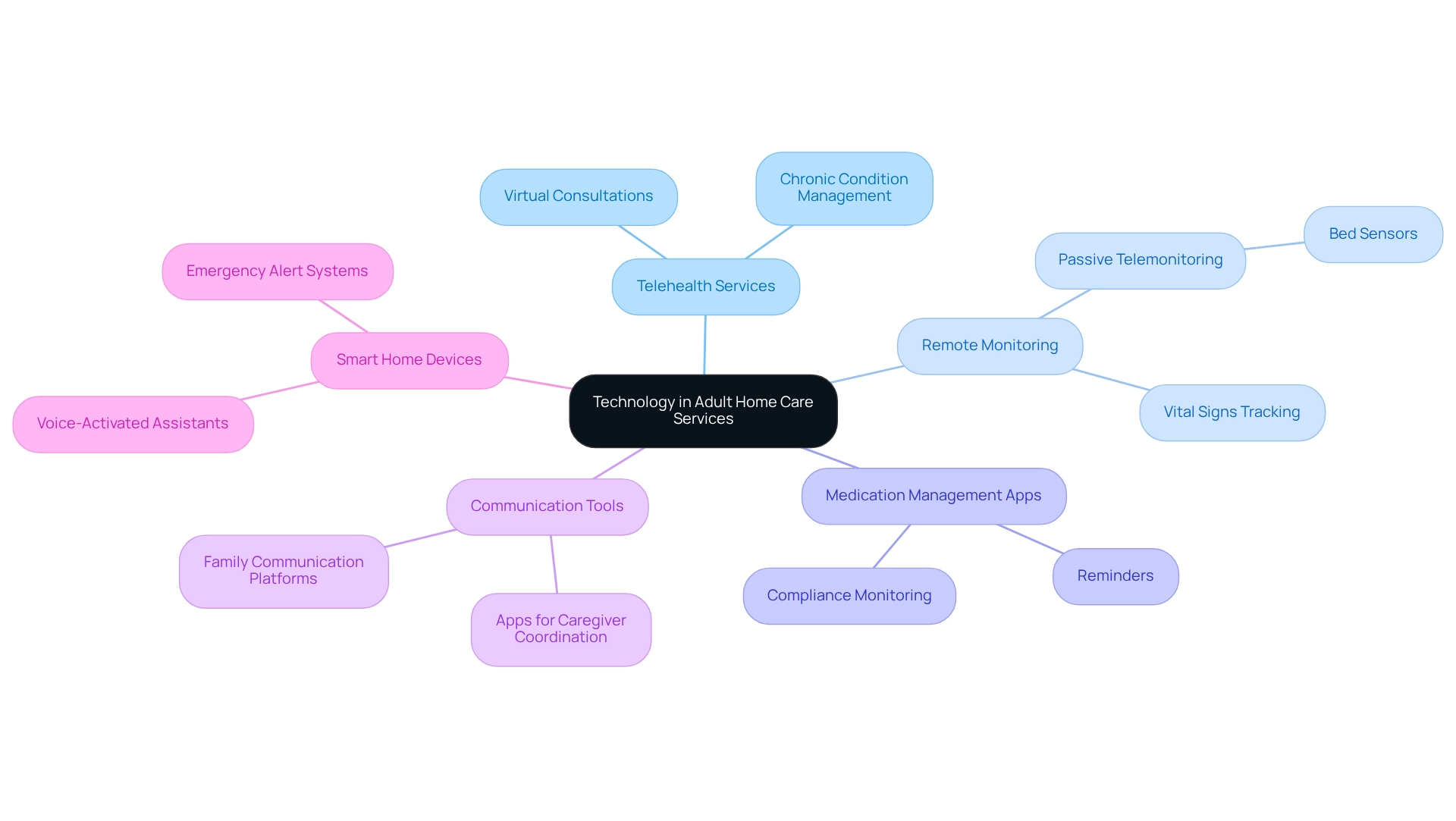
Next Steps: Taking Action for Your Loved One’s Home Care Needs
To effectively address your loved one’s domestic support needs, follow these essential steps:
- Assess Needs: Begin by thoroughly evaluating the specific assistance requirements of your loved one. This encompasses understanding their medical conditions, daily living tasks, and any support they may need.
- Research Providers: Explore trustworthy adult home care agencies in your area, such as Best Nurses Registry, which provides flexible payment options including long-term care insurance, private pay, and VA benefits. Search for agencies with favorable feedback and confirmed qualifications to guarantee quality assistance.
- Schedule Consultations: Set up meetings with prospective providers to talk about their services, pricing structures, and support plans. This step is crucial for understanding how each agency can meet your loved one’s unique needs. At Best Care, our committed team, including skilled administrators and support providers, are prepared to help you in developing a customized support plan.
- Involve Your Loved One: Engage your loved one in discussions about their preferences for assistance. This participation not only honors their independence but also improves their comfort and satisfaction with the support they will receive.
- Create a Support Plan: Collaborate with the chosen provider to develop a personalized support strategy. This plan should comprehensively address all identified needs, ensuring that your loved one receives tailored support. Best Care Nurses Registry highlights the significance of tailored support matching to ensure empathetic adult home care services.
Best Care Nurses Registry provides a variety of offerings, including personal assistance, companionship, skilled nursing, and respite services, all tailored to meet the diverse needs of clients receiving adult home care. Statistics show that 48% of individuals receiving assistance live in their own residences, while 35% live in the home of their supporter, emphasizing the significance of efficient planning for in-home support. Furthermore, numerous families indicate that developing support plans with providers greatly enhances the quality of assistance received.
As you navigate this process, remember that the financial burden of providing care can be substantial; the average individual in this role spends over $5,500 annually on out-of-pocket expenses, and many working individuals in this position report that increased caregiving expenses have depleted their savings. Moreover, it’s essential to recognize that 32% of veteran support recipients (post 9/11) lack health insurance, highlighting the necessity to evaluate financial resources when organizing home assistance. The worth of relatives providing support services is estimated at $306 billion each year, highlighting the essential role they fulfill in the support ecosystem.
Therefore, seeking financial assistance and resources, such as those offered by Best Care, can alleviate some of the economic pressures associated with caregiving. By taking these steps, families can ensure that their loved ones receive the compassionate and personalized care they deserve. For more information or to discuss your specific needs, please call Best Care Nurses Registry at (888) 203-2529.
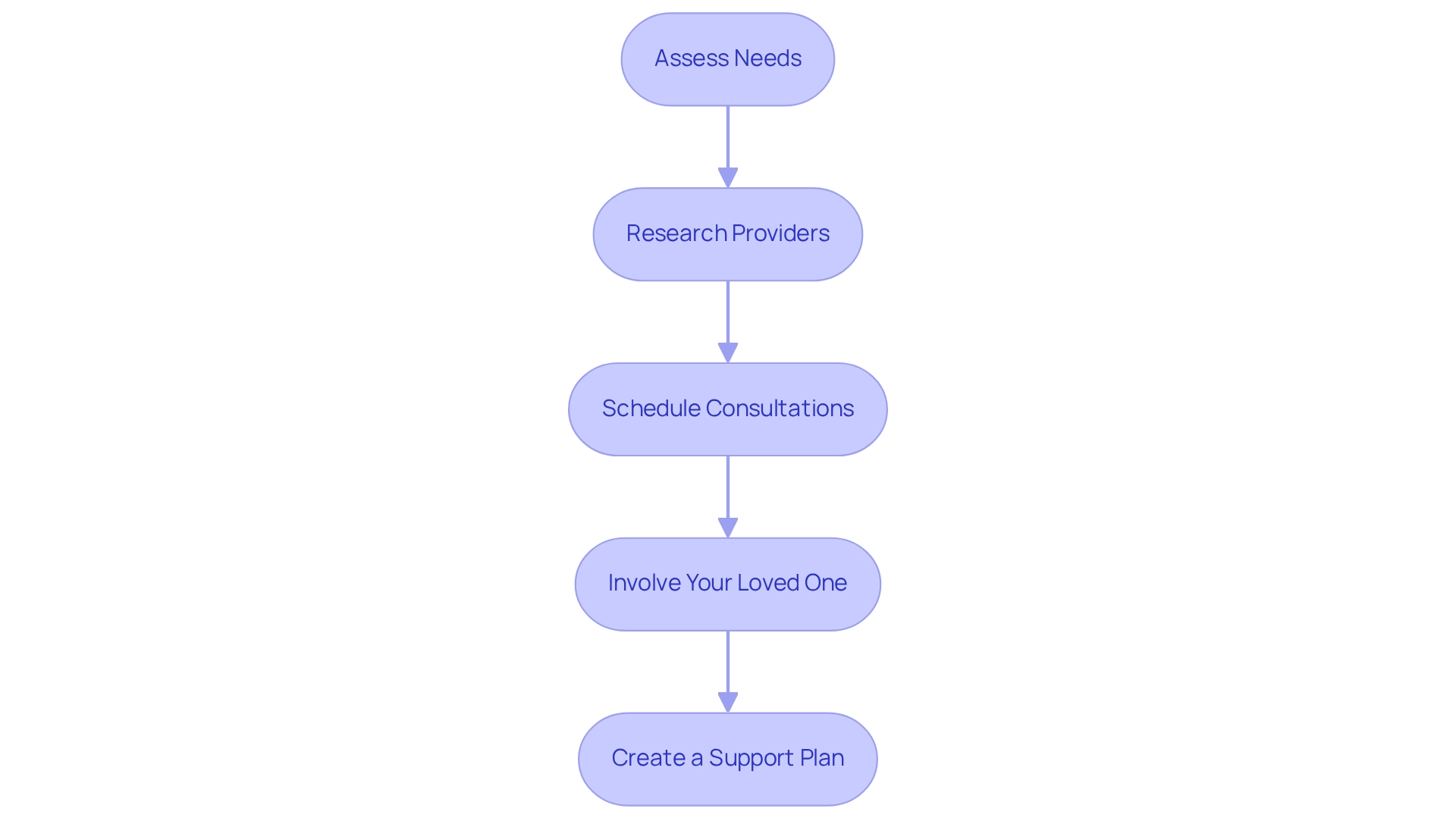
Conclusion
In summary, adult home care services provide essential support for seniors and individuals with disabilities, enabling them to maintain their independence while receiving personalized care in the comfort of their own homes. With a range of services available—including personal care, companionship, skilled nursing, and physical therapy—families can choose the right options to meet the unique needs of their loved ones. This care model not only enhances the quality of life for clients but also alleviates the emotional burdens placed on family caregivers.
The benefits of adult home care are numerous. They promote independence, improve emotional well-being, and offer cost-effective alternatives to traditional nursing facilities. As the demand for home care continues to rise, understanding the various services and providers available is vital for families navigating this important decision. With the right support, families can foster a collaborative caregiving environment that prioritizes the needs and preferences of their loved ones.
Ultimately, the growing emphasis on personalized care and the integration of technology in home health services underscores the importance of choosing a provider that aligns with the specific requirements of the individual. By actively engaging in the selection process and maintaining open communication with caregivers, families can ensure that their loved ones receive the compassionate, effective care they deserve. Together, we can pave the way for a fulfilling and independent life at home.
Frequently Asked Questions
What is adult support and who does it assist?
Adult support encompasses a range of services designed to assist individuals, particularly seniors and those with disabilities, in their own homes. It includes personal assistance with daily tasks, medical support, and companionship, all aimed at fostering independence and ensuring safety.
What is the primary goal of adult support services?
The primary goal of adult support services is to enable individuals to live comfortably in their residences while receiving essential assistance tailored to their specific needs.
What factors are driving the growth of the adult support services market?
The adult support services market is experiencing significant growth due to a rising senior population that prefers to age in place, with projections indicating a need for personal support assistants and home health workers.
What types of services are included in adult home care?
Adult home care services include personal care services, companionship services, skilled nursing services, physical therapy, homemaker services, and respite services.
How do personal care services benefit seniors?
Personal care services assist individuals with daily activities such as bathing, dressing, grooming, and personal hygiene tasks, preserving dignity and independence among seniors.
What role do companionship services play in adult support?
Companionship services provide essential social interaction and emotional support, helping to alleviate feelings of loneliness and isolation that many older adults experience.
What are skilled nursing services and why are they important?
Skilled nursing services, delivered by registered nurses or licensed practical nurses, encompass medical assistance such as medication management and chronic condition monitoring, which is crucial for seniors with complex health needs.
How do at-home health services compare to traditional nursing facilities in terms of cost?
At-home health services are often more cost-effective than traditional nursing facilities, allowing families to access quality assistance without financial strain.
What trends are currently shaping adult residential services?
Current trends emphasize the importance of individualized support and the integration of technology to enhance service delivery, improving the quality of life for seniors and providing emotional support for family members.
How can families learn more about adult support options?
Families can learn more about adult support options by contacting Best Care Nurses Registry at (888) 203-2529 to schedule a consultation.











